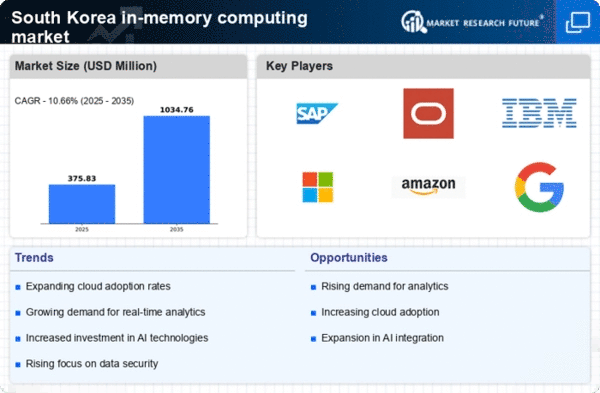Emergence of Big Data Technologies
The emergence of big data technologies is significantly influencing the in memory-computing market in South Korea. As organizations generate and collect vast amounts of data, the need for efficient processing and analysis becomes paramount. In memory-computing solutions offer the capability to handle large datasets with speed and efficiency, making them an attractive option for businesses aiming to derive insights from their data. The big data analytics market in South Korea is anticipated to reach approximately $2 billion by 2026, indicating a robust demand for technologies that can support data-driven decision-making. Consequently, the in memory-computing market is likely to benefit from this trend, as companies increasingly adopt these solutions to enhance their analytical capabilities and improve operational efficiency.
Increased Adoption of Cloud Services
The in memory-computing market in South Korea is experiencing a notable surge due to the increased adoption of cloud services. Organizations are increasingly migrating their operations to cloud platforms, which facilitate the deployment of in memory-computing solutions. This shift is driven by the need for scalable and flexible computing resources, enabling businesses to process large volumes of data in real-time. According to recent data, the cloud services market in South Korea is projected to grow at a CAGR of approximately 15% over the next five years. This growth is likely to bolster the in memory-computing market, as companies seek to leverage cloud capabilities for enhanced data processing and analytics. As a result, the demand for in memory-computing solutions is expected to rise, further solidifying its position in the technology landscape.
Advancements in Hardware Technologies
Advancements in hardware technologies are playing a pivotal role in shaping the in memory-computing market in South Korea. The development of faster processors and increased memory capacities enables more efficient data processing and storage, which are essential for in memory-computing applications. As hardware becomes more capable, organizations are more inclined to invest in memory-computing solutions to leverage these advancements. The market for high-performance computing systems is projected to grow significantly, with estimates suggesting a CAGR of around 12% over the next few years. This growth is likely to enhance the capabilities of in memory-computing solutions, making them more attractive to businesses seeking to optimize their data processing capabilities.
Growing Need for Enhanced Customer Experiences
In the competitive landscape of South Korea, businesses are increasingly focusing on enhancing customer experiences, which is driving the in memory-computing market. Companies are leveraging in memory-computing solutions to analyze customer data in real-time, enabling them to deliver personalized services and products. This trend is particularly evident in sectors such as retail and finance, where understanding customer behavior is crucial for success. The ability to process data quickly allows organizations to respond to customer needs promptly, thereby improving satisfaction and loyalty. As businesses continue to prioritize customer-centric strategies, the demand for in memory-computing solutions is expected to grow, positioning the market for further expansion in the coming years.
Rising Focus on Business Intelligence Solutions
The rising focus on business intelligence (BI) solutions is significantly impacting the in memory-computing market in South Korea. Organizations are increasingly recognizing the value of data-driven insights for strategic decision-making. In memory-computing solutions facilitate real-time data analysis, which is crucial for effective BI. As companies strive to enhance their analytical capabilities, the demand for in memory-computing technologies is expected to rise. The BI market in South Korea is projected to grow to approximately $1.5 billion by 2027, indicating a strong inclination towards solutions that can provide timely and actionable insights. This trend suggests that the in memory-computing market will continue to thrive as businesses seek to harness the power of data for competitive advantage.
















